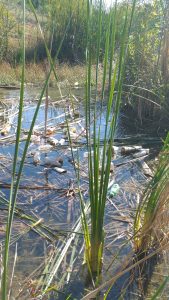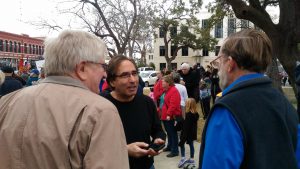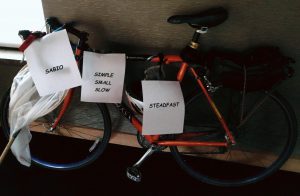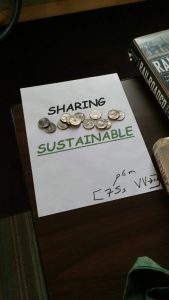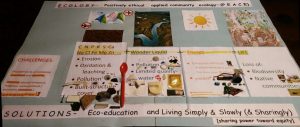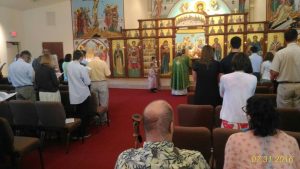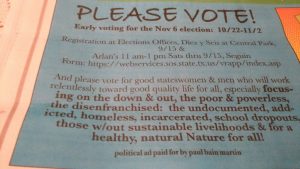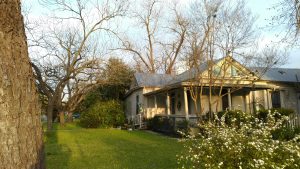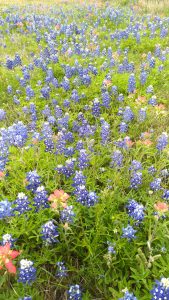Toward a Clean Sustainable Seguin
[And an imagined conversation of a father (Pablo) and
his oldest son (Jeremias)
Jan 2007 (pbm)]
Enrolada*
Depression and Pinchot-wired parents taught us to conserve.
2007 Chosen People-fundamentalist preachers impel us to grab and rule the all that WE MOST CERTAINLY deserve.
Humility, frugality used to be preached in the churches.
America First!!! War!! Estados Unidos sempre precisa ganhar! … And the ship of state lurches.
Donald Trump, Warren Buffett, Bill Gates. The power reigns.
Others squalid in big city/rural remains.
So green! So green! A new gas-electric hybrid auto and a muito verde LEED home built for only 200, 000 times what half the individuals in the world make in a year.
“Organicissimo!! Organicissimo!!” With this certified pesticide-free apple sent from New Zealand for our fresh fruit Texas party of Christmas cheer.
“Environmentists”’ answer is “R enewable”. Used only a half million BTUs per capita last year of ethanol and fuel cell energy.
… Did I mention it cost about a million British Thermal Units of oil, gas and coal. Don’t you love the synergy?!?!
Cars cause super-problems; we rush for more.
9-11! Pres says rush for the store.
Indoor pools, treadmill exercise machines..
Could we become Mexican Raramuri or Kenyan Kalenjins and make the whole earth Nature’s park, and run it in our jeans … and get it back into concert with our genes?
Hot outside? Turn on the arcondicionados! Keep eating more gas, oil, coal fueled potatoes.
Global warming (Climate change)? Highly recommend moving from Barbados.
The Chosen few of the world possess Capital and are Landed,
While the Third World is kwashiorkor- stranded.
7 billion Homo sapiens—Number ONE!!!
Other top trophic species? You’re certainly done!
Top soil? Watersheds? Diverse biotic communities? Passive solar energy? Who the hell has heard of “it”??
Big screens, NFL, NBA, empty calories—chips and beer. All of this is what keeps the U.S. lit.
Farm subsidies, conservation easements, cheap energy and basic resources from abroad. For the Lorded Landed this spells more cash!
Certainly can’t cap excessive income and capital gains, strive for real equity and equality and produce less trash!
Trans Texas Corridors! Loops around Interstate jams. Muckity, muckity, muck, muck, muck.
I’ll solve it by traversing overLand with my on-steroids Hummer, ATV, Suburban, and Big diesel truck.
Frequent flyer miles, ecotourism, luxury ‘beachcombing”, Carnival Cruise.
Explain for me again now those South American favela blues!?!
Come to our High Schools and Universities and learn to change the world faster.
No matter this “serves” to make the Natural ecosphere much less of a laster.
Mold those young uns into businessmen, corporate lawyers, sports physicians, oil field geologists.
But “Heaven forbid” an environmentalist or world renowned ecologist!
It’s the parents’ fault, the teacher’s culpa, the administrators get in the way; a federal problem, a local one. The village! The family! The individual student! … Let’s get more realistic!!!
It’s all of these. Just start somewhere and stay focused on it with lots of will and energy. Get off your butt and think holistic!
Radios, TVs, cell phones, iPods, video games, plastics, petroleum perfumes,Taco bell food, this dam computer screen. Peggy Lee cries out, “Is That All There Is?” … VIRTUAL reality?
Think this is really messing with my Natural innate personality!
Go out into the country, inner city or even suburban streets.
In this wealthiest of nations you’ll find unattended-to obesity, high blood pressure, diabetes, asthma, cancer, malnutrition– to which I would attribute bad (or lack of) local doctors, politics and economics, chambers of commerce, ecological ignorance and apathy, and high fructose corn-based sweets.
Arteriosclerosis, arthrosclerosis, hypertension, embolism, angina, arrhythmia, heart attack, stroke. Could it be our way of life??
Perhaps we could just slow down and do it the natural way and give (human) Nature less strife??
Small is beautiful! Don’t let them tease you!!
Big is passé … pasado. Communidades que pensa grandao are screwed.
War. Basic/Airborne Ranger/Green Beret Special Forces training–into fit muscled/artificial “Army of One”- MEN (and woMEN). Uniforms, weapons, order, brass gives us meaning.
Could we all do a chaotic Peace Corps thing –and rather than destroy do just cleaning?
Haifa, Chechnya, Darfur, Cuba, the deep dark Congo.
Their notoriety? “ Isn’t one of those where they invented the bongo?”
……………………
I’m confused!!!!
Or too much BS infused?
Got to act local.
I’m not just a Seguin yokel.
——————————————————–
*Brazilian Portuguese for “totally messed up!!” (An acquaintance of mind who writes some really good poetry, songs, and plays—and who is Artist-in-Residence at the Southwest Collection of Texas Tech University www.texaslegacy.org/bb/transcripts/wilkinsonandytxt.html often says something about “the poets always getting there and telling it like it is first.” Obviously I’m not a poet and what I’ve written herein is old hash, but I thought I might take a shot at writing some “poems” and perhaps be transformed into one before I pass!?!)
……………………………..
pablo “I have my New Year’s Resolutions for the Annual Resolution Party!!!
1) I’m going to really get to know all the folk on our wonderful Elm Street.
And in future years I’ll spread north and south and get to know folk on other streets.
2) And I’ll give them this “Clean Sustainable Seguin Plan” and teach them about
top soil and watersheds, and climax/subclimax biotic communities
and ethical use of daily available solar energy!!”
Jeremias “The first little part sounds fantastic. …
But I’m real concerned about the rest!!!”
The objectives of this piece of work herein are to: 1) collect my thoughts about sustainability for my home town, 2) attempt to begin more dialogue with the margins of the choir and activate them toward Deep(er) Ecology, and 3) bring a few more into the choir.
We do have significant knowledge and scientific acceptance of “Natural Law,” i.e. physical and biological principles like entropy, biogeochemical cycles and photosynthesis, evolution via natural selection, etc., community succession and trophic levels, carrying capacity, territoriality, effective local community communication and having real ecologically-sound fun, etc., etc.. Therefore, it seems almost impossible that there are folk who don’t realize the serious local and global problems of rampant conversions of Nature (e.g., somewhat it was like 10,000 years ago or even 150 years ago) to very artificial systems.
Nevertheless, there is a prevalence of: 1) ignorance about ecological principles; 2) superstition (Heaven, Calvinism, Rapture and Armageddon, Chosen People, One True Religion, One True God, …), traditions, imbedded cultural mores; and 3) technological fix mindsets which continue to facilitate the scorching and paving of earth (resulting in desertification, global warming) —and contribute to continuing global poverty and war, … but also continue to rant “technology will fix all the nasty socio-political/economic–ECOLOGICAL damage we’ve done”. [Many pseudo or wantabe conservationists/conservatives are technological fixers and are guilty of masking the continued energetic burn of the Natural World—and/or they are serving as catalysts for this burn through the promotion of processes of conventional/industrial organic agriculture, inappropriate biotechnology, and development of various energy sources such as fuel cells, nuclear fission/and even fusion?, and various “renewable” alternatives other than reliance on solar energy capture that is local and ethical.]
When we consider these social complexities, I would hope that people of my persuasion (and I believe there are many of us—and many more who’d like to be) won’t become frustrated and cynical, and throw up their arms and give up. We must continue to support a conserving and sustaining process that includes 1) faith in the Natural World, 2) hope that as a community we can stave off the Seven Deadly Sins, 3) charity and love for all of humanity and the Natural World.
And it is of utmost importance that we must work hard (but with pleasure and celebration) locally to: 1) conserve topsoil, 2) maintain watersheds in a healthy and sustainable/Natural state, 3) protect and enhance biological diversity, 4) slow down our economic engine to the point that it runs sustainably on daily ethical use of the sun, 5) emphasize sufficiency more than efficiency, 6) utilize the appropriate technologies we already have in a sustainable way, vs. always searching for more appropriate technologies, and 7) recognize that health, education and welfare are all ecological concerns.
What is the significance of a “sustainable Seguin?”
A sustainable system is one which has adequate ecological resources (minerals, water, ethical energy, biotic diversity) and a suitable socio-political/economic system (equity, representation, …) for developing and maintaining quality life for as many individuals and species for as long as possible. Discussions of quality life–whether the remaining resource base (top soil, watersheds, ecological diversity, energy flux) is half full or half empty**–and which individuals and species are important, proliferates throughout the scientific literature. [**This really isn’t all that important—what is crucial is that it is increasingly emptying.] Moreover, the concept and process of sustainability has been thoroughly discussed in the literature, including suggested pragmatic steps toward achieving—“Holistic Management,” and the state/mindset we might eventually desire to achieve—“Deep(er) Ecology.”
Despite the difficulty we may have in grasping the concept and utility of sustainability, it seems imperative … that we grapple with it. Though the often-stated goal of sustainability as systems which are socially just, ecologically sound and humane, is very simplistic, it does seem to be admirable and necessary–and one which we must strive to attain.
Jeremias “Come on Dad. Don’t be so high and mighty–and esoteric. No one really cares about this—or even understands it. As you often say—let’s live for the moment. To hell with ‘sustainability’ of the World’s ‘natural resource base!!’”
Could you flesh this concept of sustainability out a bit more?
The goal of a process of “Conservation and Development of Sustainable Community”, or what I’ve come to label “Positively Ethical Applied Community Ecology” and others might call “Holistic Management” or “Deep(er) Ecology” is “quality life for all—species—for as long as possible.” Strategy, objectives, policy deals with: 1) the conflict of reducing the conversion of Nature into too many humans–or individuals of other
species–at which point we call them serious pests, and 2) into too much financial/built capital and 3) increasing the flow of resources to truly poor humans. Significant challenges include distribution–poor, inequitable, erratic—of resources/energy, people, education, short and long-term medical care, culture—and the absurd acceptance of much of the bad in culture/religion/tradition. Appropriate actions can be particularly difficult. Local action might be more doable and less messy than global actions—which can seem impossible or futile, and really messy; but global situations can sometimes render local actions almost useless.
Perhaps one of the better definitions concerned with “Conservation and Development of Sustainable Community” describes a sustainable community as one that can evolve indefinitely toward greater human utility (including reference to all sectors of the human component of community—blue collar and white collar workers, rich and poor, brown and pink, Zoroastrian and Christian, etc.), greater efficiency of resource use (e.g., of South Central Texas Savannah) and a balance with the environment that is favorable to humans and most other species (Harwood. 1990. Soil and Water Conservation Society). The beauty of this definition is that practically no one can be against conservation and development of sustainable community, at least in a superficial, sort of abstract way of viewing it. Sustainable communities are ecologically sound, socially just and humane—and who can be against that.
Of course the problem is when the rubber meets the road. Ecosystem processes—biogeochemical cycles, energetics are zero sum operations. If you (el gringo usando muchas cosas y producindo mas gringitos, o un “coconut” haciendo lo mismo) are using more that “your share,” you are taking from other important and deserving components of the whole. And when these uses/these “needs” become politically and economically expedient; or they become habit, tradition, cultural, religious–then we really begin to have some real problems in getting off of the non-sustainable treadmill.
A major emphasis of this sustainable process is to consider your management unit (watershed/basin/catchment, county, township, etc.) as a closed system, and to not worry about whether the natural resource base is half full, or half empty, but to realize that it is emptying—and for the future of quality life for people, that’s not good. Moreover, we need to wake up to the fact that we could share lots more than what we appropriate for the truly poor of the world—and help them have a bit more quality in life.
Are we currently working toward achieving a sustainable Seguin?
I think most folk give little thought to long term quality of life and sustainability, but probably feel that we are. However, we probably are not!
1. In order to work toward sustainability we need to begin to come to some sort of holistic community consensus as to our interpretation of what is sustainability. This would involve a dynamic strategic planning process of establishing goals and a mission statement, and the policy and tactics (including sustainability indicators and assessment) toward conservation and sustainability.
2. The process of sustainability would involve continuing community-wide education concerning the concept, ecological principles and knowledge of local ecological processes, sustainability indicators, assessment tools, and development and realization of immediate and long-range socio-political/economic actions.
3. The process toward sustainability must involve ways of “becoming” and “doing.” It seems apparent to me that in my lifetime we have become less racist as a country as a result of thorough national and local discussions, evaluations and analysis of race issues and problems–although we still have along way to go toward achieving perfection, and even though we can easily fall back into a seriously racist mindset, … locally, regionally and nationally. Moreover, I believe social, political and economic affirmative action and desegregation has helped to root out racism.
The problem of dealing with non-sustainability is much more complex. For one thing, the concept of “sustainability” is even more amorphous, illusive, and non-discrete than racism. Moreover, racism is but one of many components of some non-sustainable systems.
Let me further emphasize how difficult achieving a dream of sustainability is by touching a bit of energy issues. Simply using (transforming) more and more energy in the world, is very disruptive to the natural resource base (top soils, healthy watersheds, diverse biotic communities), food chain and webs and stable ecosystems. Moreover, means of collection or storage of diffuse energy such as photovoltaic cells, windtricity, wave and tidal electrical generators, hydrogen run fuel cells, geothermal systems and biomass are energetically very expensive. And one concentrated energy alternative to fossil fuels—use of uranium and other fissionable fuels in nuclear reactors–has very high short and long-term pollution and security costs. Yet everyday we see mention of false hope proposals–including various twists and spins, and shell games–with these so-called energy alternatives. In reality, what we should be hearing about in the news media is strategies and tactics for conservation. … That’s conservation! Conservation! Conservation!! Conservation!!! … .
Finally, with respect to what might be appropriate or non-appropriate in the arena of “being and doing,” the effort proposed herein is not really intended to make anyone or any sector of our community feel guilty, but rather intended to stimulate thoughtful, meaningful, productive (long-term) dialogue—including “with self”, … to educate, and to enable (empower), and to mobilize effective applied ecologists into our local community.
pablo “You know, you’d think everyone would be anti-growth, etc., etc. and pro Conservation, and for Development of Sustainable Community, etc., etc. by now—at least if they were educated (in ecology) …” Jeremias “Aw come on Dad, grow up. … As John Prine sang so beautifully, ‘… humans ain’t humans; … people ain’t kind.’”
Is sustainability necessarily of importance to the people of Seguin?
I think it is important to current Seguinites and to future Seguinites—and this includes people and other species. Diversity makes life “interesting” and really worth living for all life forms. Without sufficient quality water, rich top soils, and effective capture of daily solar energy by photosynthesizers—diversity is limited. And diversity is a basic tenet of sustainability.
The Renaissance and the Age of Reason/the Enlightenment have long since taken place, and many decision-makers realize we have the knowledge, power and responsibility to change the human and world condition toward enhancing rather than destroying biotic diversity, toward sustainability and toward quality life for all. In addition, we know that asphalt and concrete and glass and steel and plastic–and other components of artificially built structures and environment (which are spreading over or indirectly extracting from climax ecological communities)–do not sustainably grow food, fiber or shelter—and do not produce the oxygen needed for many life forms, but rather produce excessive amounts of carbon dioxide and pollutants. Science, common sense, and intuition tell us we need to make some drastic changes away from built and financial capital to natural, and social capital. And that important change must begin locally—and right now!
Of course a major problem is that a significant percent of humans in the world do feel that at some level, they do have quality life—and they are satisfied, even addicted to the fossil-fuel dependent built environment, and current political, social, cultural, and financial systems. They get more than their share of abundant calories and have the potential to select appropriate nutrients. They live, work, travel and exercise in a relatively comfortable temperature year-round. They have the muscle and power of wheels with more than one hundred horses (and some artificial horses can even be employed to give them needed exercise with a moving road or water stream). Entertainment and “education” is electronic and remotely controlled with their fingertips. Moreover, under these artificial conditions, they tend to forget and distance themselves more and more from Darfur, Afghanistan and Iraq; favelas, slum and ghettos; the horrific (non)living conditions of other cultures and ethnicities; eroded Land, air and water pollution, species extinction, desertification; or even the spiritually empty Mother, Father or Child next door. This is despite the fact and because of the fact that it is right there on the radio or TV screen in there own little isolated and falsely “secure” industrialized home.
And it is these satisfied people with the power … that have The Power.
Nevertheless change toward more equity and humaneness for all humans and other species must begin locally and globally—and right now. Perhaps it won’t be easy. However, it is doable–and can be fun.
Therefore, deep down, intuitively, using our common-sense and critical and creative thinking capacities and involving science, we know we need to change, and that we must start immediately. Herein (to follow shortly) are some ideas for short-term and longer-term actions in Seguin (and for south central Texas, the U.S., the world).
These proposed actions are really nothing new. However, I do hope to personally work harder at realizing them myself until I pass away. And I hope others will really join in, and help to spread active lifestyles of “Conservation and Development of Sustainable Community” or “Positively Ethical Applied Community Ecology” long after I and they pass.
Jeremias “ Now Pop. You know what is important to folk–‘Faster horses, … , older whiskey, MORE MONEY!’ … Seriously Dad!! You know it’s more money–maybe funny money/credit cards, etc.—but more money, bigger homes, more food, a bigger car/Hummer/Cadillac Escalade, power (and Wars that give us meaning), prestige (no matter how phony) that counts. Get real Dad. You know it’s always been that way.” pablo “I disagree Jer’! Anthropologic, archeologic, cultural sociologic data indicates that for thousands of years, folk not that genetically distinct from us, lived in concert with the environment, especially relatively speaking; they only worked 15-20 hours per week; they had a rich cultural and spiritual life including wonderful works of art; and they lived relatively healthy—and INTERESTING lives.”
It seems that there are two major forces tugging to tear apart sustainability—the forces of tradition, and the forces of rampant change in this very mobile and fluid world? What do you say to that?
Certainly religious and cultural traditions—and especially the more recent ones can encumber movement toward more sustainable systems. However, many traditions (those encouraging frugality and holistic efficiency, and caution and tentativeness in any of our actions, rest on the Sabbath, the Golden Rule, many of the rules followed from great religious books) are foundations of sustainable systems.
Moreover, many sectors of the go-go world are beginning to tire, and to stop and critically and creatively think and act. They are beginning to think that we do need to take time to “stop and smell the roses,” to enjoy sitting down to a home-made/self-made, locally-grown meal and rich fellowship with family and friends, that “small is beautiful” and that many of the simple Natural things our grandparents and ours did—and that hunter-gatherers practiced—make more sense toward having sustainable quality life that our industrialized, artificial chemical, electronic world.
We could continue succumb to forces of non-sustainable (recent) traditions and impetus to rapid and rampant change and squandering away time and resources—working hard to fix-it, improve, develop; make and spend/even save money; use water, pave; convert Natural to artificial, or we could slow the economic/industrial/artificial chemical/electrical/information engine down and conserve: soil, quality water, the ultimate renewable energy/natural resource capturers/conservers—i.e., diverse plant/biotic communities, and high quality energy.
Jeremias “Daddy, start listening to some successful communicators, would you? You just aren’t going to get folk super excited with your litany of: slow down and smell the native flora, do less, be less competitive, sweat (or freeze) in a non-air-conditioned home and conserve, get rid of your muscle car and conserve, have less kids (and really conserve!!). … That’s no fun.
Developing, significant rapid change, cutting down, digging up, planting something new, burning, bulldozing, tearing up, destruction, war. War on drugs. War on the environment. War on Iraq. That’s Ameeericun!! That’s where it’s at; … what it’s about! Come on Dad—get hip! Get with the program!! …
We’re number one! We’re number one! We’re number one! … USA! USA! USA! …”
What are some “sustainable actions” we (especially personal/PBM actions in this first year) might take in Seguin for the short term? (Now/2007)***
Wholeheartedly support Betsy Martin in her teaching with the Seguin ISD
Baby-sit my grandkids whenever needed
Go to Mass with my Mom each Friday, and see my Mom-in-law on that day
Go to Mass at Our Lady of Guadalupe each Sunday
Work at improving my Spanish, Portuguese and Polish (and English), i.e.,
try to do a better job of communicating
Get to truly know all my neighbors on Elm Street through opportunistic encounters, door knocking, and pot-luck get-togethers. Then begin to get to know neighbors on other streets of Seguin
By example encourage biking and walking, car-pooling and mass transport; also by example encourage folk to conserve and “be sustainable” in every little way they can
Take out a monthly (or perhaps weekly) ad–listing these sustainable actions suggested herein (after they are reworked and reformatted—and reviewed and reworked), and asking why we aren’t taking them. Check them off as we begin to realize them as a community
Set up a collection of books/materials related to “conservation and development of sustainable community” for folk to read—in the library, schools, at Chiro-Java, Our Lady of Guadalupe Catholic Church
Encourage reduction of using disposable plastic bags. Begin to meet with managers of major stores, and attempt to spark campaign of “Bring your Own Bag”
Try to get at least one person from Seguin to attend an Ogallala Commons meeting this year
Join a significant local service club, and study local politics
Attend local political meetings and contribute to get-out-the-vote efforts
Look into ways of donating wild pig meat to the local food bank, or cooking it and distributing to the poor in other ways
Build a solar water heater, rainwater catchment system, composting toilet on the Martin kids’ farm near Stockdale and for the Betsy Martin house here in Seguin (work to put in other sustainable systems)
Support anti-war and pacifist efforts—locally and internationally. (Stay in touch with the American Friends Service Committee efforts.)
Always give others credit for progress toward conservation and sustainability and try to stay in the background
Be honest. But try to be honest in an upbeat positive manner.
Help people to realize that despite the failure of the major political parties’ War in Iraq, that they have been very successful in their War on the Environment and the natural resource base
Realize through collaboration with Texas Lutheran University some regular rational discussions of topics like capital punishment, abortion, war, pacifism, religion, school size, organized sports, growth, economic development, conservation, sustainable agriculture, sustainable community, desertification, species extinction, which result in some critical/creative thinking that is science-based
Develop a doable plan that involves participatory goal-setting, policy development, rapid appraisal, action plans, assessment, etc. with planned attempts for consensus buy-in by the “whole” community
Jeremias “You know. Most of these proposed actions are doable—and worth doing!”
What about plans and actions for the intermediate future? (2-5 yrs/2009-2012)***
Have a neighborhood/community get-together twice a year
Work toward having one spring Sunday afternoon where everyone in the city gets out in the streets and walks to the opposite side of town with a dozen flowers in there hand—exchanging stories and flowers along the way
Cautiously get more involved “sustainably” with Our Lady of Guadalupe and local clubs, etc.
Write articles on local, state and national actions that are non-sustainable (TTC, State Highway 130; fuel cell and ethanol initiatives; …) and suggest alternative sustainable actions
Organize a local group (cautiously organized but open to anyone, self-selecting) which will systematically, holistically, strategically and sustainably plan toward a clean and sustainable Seguin
Get 50% to everyone thinking about walking, biking or using the bus when getting around in Seguin
Develop a [(an)Ad] campaign for recycling organic matter/composting on individual lots, e.g. a component of this might be a “Don’t Bag It” campaign for lawn clippings
Encourage a city/county wide of REDUCTION, reusing, and recycling of “waste” (including water and energy) [Shoot for Zero Waste–and consider calling the program “Clean Sustainable Seguin’s Zero Waste Program”]
Begin rapid and long term dynamic and holistic appraisals of the ecological (socio-political, economic, ecological) resource base of Seguin (this would include a historical component)
Get local folk to consider ways of protecting our local natural resource base by renovating existing building for use as homes and offices, and for industry, building smaller homes and buildings that are truly GREEN, considering Wildlife Exemptions to property taxes, and to consider donating Conservation Easements
Develop a CD—or other with sustainable music work by Andy Wilkinson, Butch Hancock, Slaid Cleaves, Terri Hendrix, Adam Carroll, Kent Finlay, … and produced by Lloyd Maines
Lay down sustainable lines of communication with other communities actively involved in conservation and development of sustainable community
Try to get 5 or more folk from Seguin to attend an Ogallala Commons meeting each year
Develop and realize a sustainable community symposium at TLU
Spread sustainability ideas to St. Philip’s College, Seguin ISD and Devine, Texas
Work with community to make participation in our local Martin Luther King march equivalent to that of San Antonio’s with respect to percent of the population, i.e., SA’s participation is ca. 100, 000 or about 1% of their population–therefore since Seguin has ca. 25, 000 inhabitants, we should shoot for 2000 to 2500 participants
Help to increase local membership in NAACP and LULAC
Develop pocket-book card reminders of sustainability and laminated sheets of similar information for local schools.
Jeremias “These are all very accomplishable also—with a bit of perseverance and time, especially after some real successes with the more short-term actions!”
What about truly sustainable long-term actions toward a clean and sustainable Seguin? (5+ yrs/2012 and beyond)***
Work hard on local and global critical and creative thinking skills
Develop user-friendly, attractive and doable ecological educational programs dealing with names of local flora and fauna—native and non-native
Work with schools, churches and clubs, other organizations in getting more parents involved in learning “the basics”—reading, writing, math, foreign languages, names and interrelationships of local flora and fauna—and the edaphic, hydrologic, and geologic conditions upon which they depend.
Develop an active participatory sports program and “get-to-know and love Nature programs” for all in this Seguin community—young, old, physically-challenged, …
Write a local newspaper column and develop a radio/TV? show re. Clean and Sustainable Seguin
Realize a program to have as much passive solar water heating, and passive cooling and heating, composting toilets, rainwater-collection systems, community gardens, etc. as “possible” in Seguin and the surrounding area
Work toward the opening and revealing of records for individual family and business water- and energy-usage; also, salaries/gross revenues and profits made
Develop a not-for-profit community tool/equipment lending center and “’sustainable’ Bed and Breakfast facility
Begin to eliminate cars from parts of Seguin
Maintain/plant sustainable crops for local food, fiber, energy and shelter
Try hard to realize smart growth/reduction of growth. Stop the paving over of good non-renewable topsoil in this region and the destruction of stable climax and sub-climax plant-animal communities. Campaign to reduce “buying” and mindless consumption. Promote the use of conservation easements, land donations for nature preserves, parks (large and small) to halt development.
Try to get folk to consider some voluntary salary capping and capping of wealth accumulation (< $200,000 ). Focus on truly helping the poor in Seguin and truly helping the truly poor in other parts of the world.
Plant several acres of greens, turnips, beets, beans, squash, radishes, etc. (easy to grow vegetables, herbs and fruit) for picking by folk with urban gardens–to supplement and for charitable organizations
Make celebratory community activities more “sustainable” and do more celebration of sustainability (including pot-luck get-togethers with live music)
Develop and teach some sustainability courses modeled after the many that exist at some of the more progressive colleges and universities
Work toward smaller neighborhood schools at all levels that are truly a part of the environment and not a part of the dynamic that separates us from the environment
Work toward a local economy with robust entrepreneurships focusing on conservation & sustainability
Help to realize a national health care program that effectively covers the poor
As a community regularly discuss Wars–and conservation and sustainability implications of these destructive (but futile) attempts to solve problems–and ways of truly realizing Peace from a local and global perspective
Work toward comprehensive on-going energetics/ecological footprint study for the Seguin region
Translate all that is herein to Spanish (and German?)
Have a community where we don’t have to think about sustainability—we just eat, drink, breathe, walk, bike, go, dance, paint, sculpt, party, and naturally think, are, do and act sustainably
[***Obviously there are many other sustainable actions we can take. For instance I have a list of 151 things one can do to build social capital in community in my files (from www.bankofideas.com.aau ) and a book of ideas for action suggested for every day of the year.]
Jeremias “Some of this seems pretty ‘Pie in the sky’. But who knows, with some other successes, with community education and collaborative efforts at conservation and sustainability, maybe so! Maybe these could be mostly achieved also!!??!!”
Some of this stuff is would be relatively easy to accomplish, but some of it is really difficult? Who can help us?
There are many good local, district, state, national and international groups who can help. But you do need a real goal and doable action plan–both written as concisely, simply, succinctly as possible as possible, prior to significant interactions with these groups. Be persistent and persevering and recognize—1. that although these groups can be very necessary helpful, they do not completely understand you and your concept of sustainability and in many ways may not be on good road to sustainability and 2. that your process, goal, action plan are dynamic and should be honed to become more and more idealistic, more pragmatic, more communicative, more doable in community as time rolls on.
Some of these groups include:
Ogallala Commons
World Wildlife Fund
Oxfam
Natural Resource Conservation Service, USDA
Resource Conservation and Development Programs
Soil and Water Conservation Districts
Texas Agricultural Extension Service
Texas Agricultural Experiment Stations
ATTRA
Holistic Resource Management of Texas
The Nature Conservancy
Audubon Society
Sierra Club
Master Naturalists
Texas Department of Agriculture
National Hispanic Environmental Council
Natural Resources Defense Council
Environmental Defense Fund
American Friends Society Committee
Land Trust Alliance
Guadalupe-Blanco River Authority
What about awareness and celebration of sustainability?
There is considerable information about conservation and development of sustainable community on the internet, in books, journals and magazines—and in the people of our community and others. Moreover, there are many old and new songs, plays, works of art that relate to and can enhance our fervor to celebrate conservation and sustainability as a community.
Listed on the following are a few examples of what is mentioned in the previous paragraph:
Websites-
www.context.org/ICLIB/IC27/Orr.htm
http://en.wikipedia.org/wiki/Sustainability
www.texaslegacy.org/
www.livelihoods.org/
www.brtom.org/wb/berry.html
www.ssu.missouri.edu/faculty/JIkerd/
www.counterpunch.org/jensen07102003.html
www.ogallalacommons.org/
www.epa.gov/greenkit/indicator.htm
www.ucdb.br/coloquio/arquivos/Paul.pdf
www.hrm-texas.org/
www.landinstitute.org/vnews/display.v/ART/2000/08/05/377bbbe53
www.365act.com/
www.bankofideas.com.au
http://mmmappliedecology.tripod.com/
www.npg.org/specialreports/bartlett_index.htm
Books-
The Art of the Common Place by Wendell Berry
Overshoot by William Catton
Environmental Science: Working with the Earth by G.T. Miller, Jr.
The Other Side of Eden: Hunters, Farmers and the Shaping of the World by Hugh Brody
Ecological Literacy by David Orr
Becoming Native to This Place by Wes Jackson
A Sand County Almanac by Aldo Leopold
Sustainable Capitalism by John Ikerd
Guns, Germs and Steel by Jared Diamond
The Creation: An Appeal to Save Life on Earth by E.O. Wilson
Food, Energy and Society by David and Marcia Pimentel
Pedagogy of the Oppressed by Paulo Freire
Holistic Resource Management by Allan Savory
Rules for Radicals by Saul Alinsky
Small Is Beautiful by E.F.Schumacher
The Omnivore’s Dilemma by Michael Pollan
On the Border: An Environmental History of San Antonio by Char Miller
Nature’s Economy by Donald Worster
Notable “Locals”-
Char Miller, Historian, Trinity University
Steve Murdock, Demographer, UTSA
Wayne Hanselka, Ecologist, TAEX & TAES, Corpus Christi
Ken Kramer, Environmental Activist, Sierra Club (Graduate of TLU), Austin
Calvin Finch, Biologist, San Antonio Water System
Kevin Anderson, Philosopher/Ecologist, Hornsby Bend Bird Observatory, Austin
Darryl Birkenfeld, Community Activist/Philosopher, Ogallala Commons, Nazareth-TX
George Ozuna, Hydrologist, US Geological Survey
pablo “You know Jeremias. Sometimes I want so bad to transcend all this.” Jeremias “What do you mean by all this?” pablo “Well I guess I mean the pseudo-/quasi-realities and shell games and dilemmas. For instance, I thought the ethos my village programmed into me was one of peace and love, compassion and tolerance, conservation and frugality, yet most everyone seems to practice anything but, and they don’t even really pretend to practice anything but. We (including me) practice bulldozing and paving, high kilocalorie consumption, ‘shock and awe’, speed (in more than one sense of the word), noise, etc.
Jeremias “Your dream is to be St. Francis of Assisi. Most people in 2007 can’t relate at all to St. Francis. Hell, he died 780 years ago!! (Besides, sixty of your years have flown by–and you’re a far cry from even starting to be St. Francis!)
Moreover, most people certainly wouldn’t use prefixes and words like ‘pseudo’, ‘quasi’, ‘shell game’, ‘dilemma’ but rather ‘impossible’ and ‘crazy’ for what you’re trying to do!
Most folk other than you are realistic and want to be Michael Jordan, Vince Young, Lance Armstrong, Tiger Woods, Hulk Hogan, T.D. Jakes, John Hagee, Pat Robertson, Martha Stewart, Oprah Winfrey, Brittany Spears, Paris Hilton, Bill Gates, Warren Buffet, or George W. Bush. … Well … um … , … maybe not George W. Bush!”
——————————————————————————————
Some “Appropriate” Mexican Dichos/Sayings:
Del dicho al hecho, hay mucho trecho.
El que quiere baile, que pague músico.
Camarón que se duerme, se lo lleva la corriente.
Una buena acción es la mejor oración.
pbm
[ 7 Ss / VV->^^ ]
